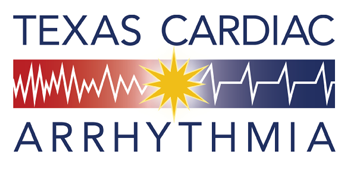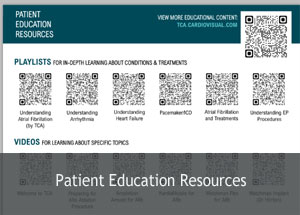Patient Education
Signs & SymptomsPalpitation Or A Skipped Beat
Although it may seem as if the heart missed a beat, really the heart has a premature heartbeat, almost an extra beat happening too soon, which may result in a pause – the “skipped beat.”
Fluttering
A fluttering sensation is usually due to a series of “skipped beats” that occur in quick succession.
Slow Heartbeat – Bradycardias
If the heartbeat is too slow, usually considered a rate below 60 beats a minute, not enough oxygen-rich blood flows through the body. So, it makes sense that the symptoms of a slow heartbeat are:
- Fatigue
- Dizziness
- Lightheadedness
- Fainting or near fainting
Rapid Heartbeat – Tachycardias
When the heart beats too quickly, usually considered a rate above 100 beats a minute, the lower chambers, or ventricles, do not have enough time to fill with blood, so they cannot effectively pump blood to the rest of the body. When this happens, some people experience:
- Skipping a beat
- Beating out of rhythm
- Palpitations
- Rapid heart action
- Shortness of breath
- Chest pain
- Dizziness
- Lightheadedness
- Fainting or near fainting.
- Chaotic, quivering or irregular rhythm
Electrical Signals
Every heart has an electrical system running throughout its muscle tissue. The sinus node, often called the heart’s natural pacemaker, contains the most active electrical cells, and it initiates heartbeats.
Other nodes are responsible for transmitting signals to different sections of the heart. For instance, the atrioventricular node’s job is to transmit signals from the upper chambers, called atria, to the lower chambers, called ventricles.
A problem in a node or anywhere along the electrical path can disrupt the regular beating of the heart and cause an arrhythmia. The heartbeat can become too fast or too slow and can be chaotic or steady. Symptoms vary based on the rhythm change.
Suddenly rapid, irregular and chaotic heartbeats may be a sign of the most dangerous arrhythmia, ventricular fibrillation. It is the number one cause of sudden cardiac death. Within seconds, an individual loses consciousness and, without immediate emergency treatment, will die within minutes.
Almost Fainting – Presyncope
Sometimes people experience symptoms before they faint. Presyncope can be a sign of a heart rhythm disorder and should be evaluated carefully.
- Dizziness, lightheadedness or vertigo
- Blurred or narrowed (tunnel) vision
- Sweating
- Nausea and/or vomiting
- Stomachache/abdominal discomfort
- Heart palpitations
- Headache
- Confusion and/or difficulty
speaking clearly or coherently
Fainting – Syncope
Fainting related to a heart rhythm disorder is more likely to happen suddenly and without warning than fainting related to other causes, such as dehydration or low blood sugar. Any sudden lose of consciousness should be evaluated by a physician.
In some cases, fainting is the only warning sign of an arrhythmia that could cause sudden cardiac death.




